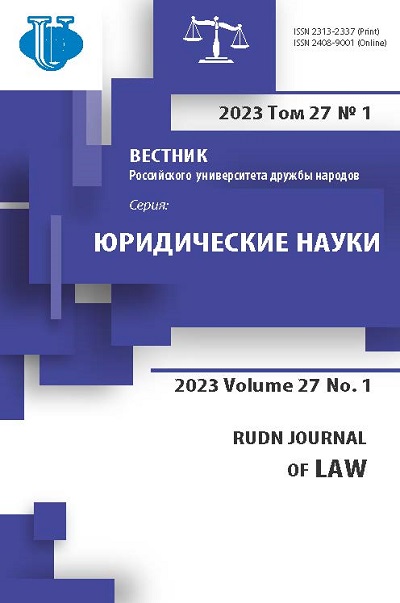Features of the experience of Kazakhstan and Belarus in the implementation of the concept of a unified body of preliminary investigation
- Authors: Babich N.V.1
-
Affiliations:
- Peoples’ Friendship University of Russia
- Issue: Vol 27, No 1 (2023)
- Pages: 221-239
- Section: CRIMINAL LAW AND CRIMINOLOGY
- URL: https://journals.rudn.ru/law/article/view/34066
- DOI: https://doi.org/10.22363/2313-2337-2023-27-1-221-239
- ID: 34066
Cite item
Full Text
Abstract
Formulation and consideration of various issues related to the improvement of the investigative apparatus of Russia are in the constant attention of representatives of legal science. The current state concept and the practical model of the country's investigative apparatus built on its basis require significant improvement in order to resolve existing organizational and procedural challenges. The purpose of the research is to identify and analyze the stages of construction, the positive and negative aspects of organization and activities of single and independent agencies of preliminary investigation in foreign countries, as well as the genesis and trends of their development. Based on the results obtained, the study formulates proposals for improving the investigative apparatus of the country regarding the Investigative Committee of Russia. To achieve this goal, the research explores the experience of organizing unified and independent preliminary investigation agencies in the countries of the former USSR and the West. All the results and conclusions were obtained using general scientific methods of scientific research: dialectical, logical, systemic, as well as private scientific and special such as comparative legal, formal legal, statistical, interpretation and a number of others. The author comes to the conclusion that organization and activities of the Investigative Committees of Russia and Belarus are basically similar, but there are some positions that differ significantly. Negative experience of building a unified and independent investigative committee was demonstrated in the Republic of Kazakhstan. The reason was insufficient attention paid to preparations on the part of the leadership to creation of such an agency. Thus, combination of functions of inquiry, operational-search, investigative, statistics and expert, as well as transfer of some of the important and inalienable powers of the prosecutor's office when creating such a law enforcement agency is unacceptable.
About the authors
Nikita V. Babich
Peoples’ Friendship University of Russia
Author for correspondence.
Email: babich_nv@pfur.ru
ORCID iD: 0000-0001-5043-1720
Candidate of Legal Science, Assistant of the Department of the Judiciary, Law Enforcement and Human Rights Activities, Law Institute
6 Miklukho-Maklaya str., Moscow, 117198, Russian FederationReferences
- Bagmet, A.M. & Tsvetkov, U.A. (2015) Strong investigation and its opponents. Lex Russica. 101(4), 60-70. (in Russian).
- Berlyavsky, L.G. & Raschetov, V.A. (2013) Formation of investigative committees in the space of the former USSR. History of State and Law. (12), 50-54. (in Russian).
- Berlyavsky, L.G. & Raschetov, V.A. (2017) Independent investigative bodies in the post-Soviet space: a comparative study. Journal of Foreign Legislation and Comparative Law. 1 (62), 114-121. (in Russian).
- Branchel, I. (2008) Preliminary investigation: its role and place in the law enforcement system. Justice of Belarus. (9), 27-30. (in Russian).
- Frolov, V.V. & Batov, V.A. (2018) The role and place of the Investigative Committee of the Russian Federation in the framework of the theory of separation of powers. Pravda i zakon. 2 (4), 24-29. (in Russian).
- Gavrilov, B.Ya. (2008) Modern criminal policy of Russia: figures and facts. Moscow, Velbi Publ., Prospekt Publ. (in Russian).
- Golovko, L.V. (2011) Kazakhstan: de-Sovietization of the criminal process. Article 1 Refusal from the stage of initiating a criminal case. Criminal Judicial Proceeding. (4), 11-13. (in Russian).
- Golovko, L.V. (2012) Police reform in the context of modernization of preliminary proceedings in the Russian criminal process. In: Criminal justice: connection of times. Selected materials of the international scientific conference. Saint Petersburg 6-8 October 2010. Moscow, Aktion-Media Publ. pp. 24-31. (in Russian).
- Goncharov, D.Yu. (2002) Independence of the investigator: to be or not to be? Journal of Russian Law. (9), 104-110. (in Russian).
- Kogamov, M.Ch. (1998) Preliminary investigation of criminal cases in the Republic of Kazakhstan: state, organization, prospects. Almaty, Ayan Edet Publ. (in Russian).
- Kogamov, M.Ch. (2009) Reforming law enforcement agencies and justice in criminal cases (fragmentary analysis of the retrospective and prospects for development in the period 1991-2008). Bulletin of the Institute of Legislation of the Republic of Kazakhstan. (2), 78-88. (in Russian).
- Kolbachev, E.B., et al. (2012) The theory of branch markets: textbook. Kolbacheva E.B., Shtapova I.S. (eds.). Rostov-on-Don, Phoenix Publ. (in Russian).
- Maltsev, L.S. (2011) Creation of the Investigative Committee of the Republic of Belarus as the implementation of the conceptual foundations of the national security of the state in modern conditions. Belaruskaya dumka. (9), 3-9. (in Russian).
- Noskevich, I.D. (2017) Establishing and restructuring of the criminal investigative authority of the Republic of Belarus. Journal of the Belarusian State University. Law. (2), 88-94. (in Russian).
- Yakubovich, N.A., Konakh, E.I., Mikhailova, T.I., Voskresensky, V.V. & Prokudina, L.A. (1995) Unfounded accusation and rehabilitation in the criminal process: method. allowance. Radchenko O.Ya. (еd.). Moscow, Research Institute for Strengthening Law and Order under the RF GP. (in Russian).
- Soloviev, N.G. (2000) Reform of the investigative apparatus: from the redistribution of jurisdiction to the modernization of the Criminal Code. Russian Justice. (12), 2-5. (in Russian).
- Shayakhmetova, A.G. (2010) Prospects for the development of law enforcement agencies and the judicial system in the Republic of Kazakhstan. Bulletin of Institute of Legislation and Legal Information of the Republic of Kazakhstan. 4 (20), 78-84. (in Russian).
- Shved, A. (2012) Legal regulation of activities and prerequisites for the formation of the Investigative Committee of the Republic of Belarus. Justice of Belarus. (11), 21-23. (in Russian).
Supplementary files















